Google paid search Marketing A Beginner's Guide
When you search for something on Google, the first thing you see in search engine results pages (SERPs) will not always be a list of organic websites.
It won't always be a SERP (featured snippet or "people also ask" list) either.
In fact, there is only one thing that can trump both: advertising(online advertising).
But paid search marketing(online advertising) is not as simple as giving Google money to publish your ad(paid search advertising). There are a lot of them, and on schedule, you'll comprehend why paid inquiry is completely helpless before the nature of your site's substance.
But first: What is paid search marketing?
Paid search marketing (google digital marketing) is any pay-per-click search engine marketing(web marketing) service offered by Google, Bing, and other search engines that allows companies to advertise directly on search results pages. Advertisers bid on the amount they are willing to pay each time a searcher clicks on their ad. This fee is called cost-per-click (CPC)(pay-per-click audit).
What is the difference between search engine marketing, search engine marketing (PPC), and paid search, online advertising?
Different names for paid request fuse web search device advancing (SEM), search publicizing, paid pursuit promoting, or basically search displaying.You may likewise have heard that paid search, online advertising are utilized reciprocally with pay-per-click (PPC) promoting. For instance, you might discover PPC ads on another advertising(online advertising) channel, such as Facebook or LinkedIn. Just remember that search engine marketing(web marketing) campaigns focus entirely on driving traffic from search engine results pages to your website.
What is the qualification between Digital marketing and organic search?
Digital marketing experts might utilize a two-dimensional methodology when drawing in rush hour gridlock from web search tools. The primary strategy, portrayed in the past area, utilizes paid advertisement organizations to convey relevant messages within search engine results. The second method uses search engine optimization (SEO) to drive organic traffic - which consists of people who naturally search for and click on links to your website. In this case, you do not pay anything to Google, your content is self-contained.Why use paid search marketing, online advertising?
Search ads can help build brand awareness - they are, after all, the first thing a user sees in SERPs.Even though search advertisements have a lower active clicking factor than the initial three natural outcomes, they convert guests at over two times the rate of natural outcomes.
Search ads have a higher CTR (3%-5%) than ad networks such as image and paid social networks (about 1%).
Paid search ads(online advertising) can be an abbreviation of your product or service pages.
They are immune to ad blockers.
Short, paid search for a long story gives you a good impact on your profit, providing a higher CTR than any other type of pay-per-click advertising(online advertising) and a stronger average conversion rate than organic search.
Paid search marketing examples:
The three most normal kinds of paid pursuit promotions that will show up in SERPs are:1. Paid search listings
These text promotions are shown as connections to site pages at the highest point of the SERPs,, and are accompanied by an "ad" disclaimer, title tag, and meta description:
2. Shopping lists
These will generally show up as a sidebar in the SERPs and will show product advertisements that lead straightforwardly to an internet-based retail location.3. Local Service Ads
How Paid Search Marketing Works
A glimpse of key terms:
Monthly search volume: The number of keyword searches per month.Impression: When your ad is displayed on the page.
click: When a client taps on your promotion.
Click-through rate (CTR): The percentage of times an impression leads to a click.
Conversion: When a user completes the requested action once they reach your ad page.
Conversion rate: the percentage of users who visit your page and complete the requested action.
Average CPC: The average cost per click.
All paid searches begin with the Google Ads program(google paid advertising), formerly known as Google AdWords. (Bing is an option too, but we'll focus on Google ads for the purpose of this guide.)
From a birder's perspective, this is how it works:
The advertiser (you) chooses the campaign type (text, shopping, etc.) in Google Ads(google paid advertising) and sets the parameters, including location, for your campaign.
The advertiser prepares a daily budget for his PPC advertisement.
The advertiser chooses the keywords he wants to list his ad with and decides his bid.
The advertiser is the one who makes the advertisement.
Each time a client looks for a catchphrase, Google (SEO paid search) concludes who will get the most noteworthy positions dependent on the bid and somewhat on the nature of the advertisement.
It looks simple enough, but it doesn't feel uncomfortable. Paid search campaigns have the potential to be highly successful lead generators or a huge waste of money, and Google(google paid advertising) is very particular about the ads they will insert for specific keywords.
The most effective method to dispatch and deal with a paid search advertising effort
1. Choose your keywords
Google Keyword Planner(paid search experts)helps you find keywords that researchers use to discover products and services similar to yours. But the data it provides for each search query is not very accurate or convincing. For more accurate numbers including monthly search volume, competition, and average CPC, consider searching keyword research tools like SEMrush, Ahrefs, Moz Keyword Explorer, or KWFinder. Ubersuggest is a free alternative.
Pay attention to the intent
When you choose your keywords, start thinking about the intent - is the user looking for information, to complete a transaction, or trying to go to a specific page? This is critical - if your ad or its content does not match the purpose of the keyword, it will fail on 'go'.
The easiest way to detect intent is to research these keywords and see what types of pages are being generated. Are they blog posts? product pages? Landing pages?
Learn about your keyword types
There are six main types of keywords to consider while planning your ad campaign:
Branded keywords
"Leatherman's multi-tool" is an illustration of a marked watchword. Branded queries usually have higher conversion rates and lower competition, which usually means lower CPC. Brands don't as a rule attempt to rank for different brands. Then again, sometimes they do (this is called conquest). It may be an attempt to steal traffic and potential customers from the competition. Or it could be an attempt to convert the user from a free tool to a paid one. For example, SEMrush, a different keyword research tool, ran the best-paid result for the keyword 'google keyword planner(paid search experts):
General keywords
“Cloud computing” is an illustration of a generic keyword. These terms tend to have a higher search volume because they are so general. This also means that they are usually more competitive - and more expensive than branded keywords. This also means that they are less targeted. "Cloud computing" for example has mixed intentions - the audience could be looking for a definition, example, a specific type of cloud computing service, etc. Ranking a generic keyword may attract many clicks, but many of those clicks may be from unwanted users who leave immediately (and remember that you pay for each of those clicks).
Long-tail keywords
keyword. Like last other long-tail keywords, it asks a really specific question. Most of the long-tail keywords have an informational intent, but some are very clearly commercial. For example, the keyword “best camping multitool” is a very strong indication that this searcher is a camper who is looking to purchase a multitool.
Related words
Think of these general keywords that are indirectly related to your product offering. For example, if you sell cloud storage, a related keyword might be “cloud security” or “is the cloud secure?” It's not directly related to your product or service, but the person looking for it may have an interest in what you're selling.
negative keywords
Negative keywords are keywords that you actively exclude from your Google Ads(paid search engine marketing) campaign. Google's support team provided an example of an optometrist who sells glasses excluding phrases such as "wine glasses" or "drinking glasses" from paid search campaigns. Keywords have the same verbiage but are not related in any way (another example of why searcher intent is important).
Competitor keywords
Remember how we brands will sometimes compete for branded keywords that they don't belong to? Well, this would be an example of keyword targeting for competitors. For example, Nike may try to compete with Adidas for paid search properties by submitting a bid for the keyword "Adidas sneakers."
Choose the match Type
When you select a keyword, Google(paid search management) lets you specify the number of occurrences of that keyword that you want to compete for. it will also give you basic four main options:
Exact match: Your ad will only be considered on the paid search network when users search for the exact keyword; For example, if you bid on "big plants", your Google ad(paid search experts) won't be considered if someone searches for "big farms" or "big farms for succulents".
Expression match: Your promotion might be viewed when clients look for the specific expression with words before or after it. So in this case, Big Succulents Grower might consider your ad if you offered Big Succulents.
Broad match: Your ad will be considered if the searcher uses the keyword phrase - and synonyms - in any order (eg, "big red planter" or even "big succulent plant").
Broad match modifier: This is the same as broad match, but excludes synonyms. A 'Large Plants Plant' will not be considered if you are bidding to purchase a 'Large Plants'. However, the "planter for large plants" would be.
2. Create attractive ads
When creating your paid search campaign, always keep a potential customer in mind. This is where Buyer Personas will help you develop your ads that truly appeal to your target audience. When creating your ad, these are the key elements.
Which will directly affect the ranking of your ad and how users interact with it. In order of importance, they are:
What page are you linking to Simply put, it must be relevant to the keyword you selected, or else you won't stand a chance against the competition? Think carefully about the action you want a user to take when they click on your ad, and make sure the page you're linking to encourages that action
Meta Title Tag: This will the title of your ad. Google(paid search experts) gives you the option to create three addresses, each with a maximum of 30 characters. Two are required, the third is optional. The first header is the most important, as the second and third headlines may be cut off depending on how the ad is displayed (for example, on a mobile device).
Meta Description: This is the description that will appear below your title. It's an essential part of ad copy that needs to resonate with your target audience. You just have 90 characters to work with, so you need to focus on the main data. Make a point to incorporate your catchphrase and any convenient data and use activity language that supports clicks.
Ad extensions: There are various types of ad extensions that you can add to a list at no additional cost per click. These include call extensions (phone number), app extensions, location extensions, and rating extensions. The most common extension is the site links below your description. Site links can improve CTR because they provide the searcher with multiple options to click, which in turn can affect the conversion rate.
3. Monitor your Quality Score
At the point when you ponder your way to deal with overseeing PPC, remember that Google utilizes progressed calculations to decide the nature of your advertisements. But that's not all - Google will also take care of the destination quality of your ads. This means that if your landing pages are of high quality(paid search marketing), your ads referring to those pages are more likely to appear in relevant search results(SEO paid search).
There are three main factors that Google(paid search experts) considers when deciding to display your ad on the search network(paid search engine):
Keyword relevance: If your keywords are not relevant to a search(seo paid search), your ad will not be shown(paid search results). Simply. This is why choosing keywords is an important part of your PPC strategy.
Maximum bid: Your maximum bid for specific keywords or an ad group(paid search marketing). An ad group is just a group of ads with similar goals (for example, they have the same landing page).
Quality Score: The Quality Score is based on the relevance of the page to the selected keyword. It is determined by the click-through rate of a web page, the previous ad performance on that page, the relevance of that page to the keyword, and other performance indicators.
Google incorporates these factors into the final result(paid search google), so to speak, called Ad Rank. The ad with the highest ad rank will rank first in the SERPs.
Now that's the thing about ad rank. Since Quality Score is such an important factor, you can actually outperform higher bidders for a keyword if and only if the webpage your ad links to is of higher quality than the webpage your competitor links to.
In other words, the highest bidder is not always the winner. Quality web content can allow you to hit more weights and really stretch your PPC budget.
On a very important SEO issue...
Paid hunt is certifiably not a substitute for site improvement (SEO).
SEO is very different from search engine marketing(paid search marketing); It's how you improve your unpaid search rankings(search engine). In fact, you should think of paid search as just a complement to your SEO efforts. The top four positions in organic search have a much higher CTR (average first position at around 32% CTR) and a much lower CPC ($0.00).
Not to mention that due to the quality score, a pay-per-click campaign without high-quality content will falter.
Don't forget to track your ROI
Phew. This was a lot.
But you're not quite done.
It's important to track the ROI of paid search campaigns, which is something you can do with your Google Ads account. The conversion rate is especially important to monitor closely.
When entering your campaign, you will need to specify how much you are willing to pay for each transfer. Keep in mind that the total estimated conversion rate for search ads is 3.75%, and this varies widely by industry. Dating apps, consumer and legal services, for example, have averages above 3.75%. But real estate and household goods are much less than that.
In case you will pay $40 per transformation and your normal CPC is $1, you will require a 2.5% conversion rate(web marketing). While your ads are running, pay attention to the conversation rate, the average cost per click, and the amount of money you spend per conversion. As you progress, you may need to readjust your expectations/goals, and/or adjust your strategy to increase your return on investment.
Well, we're done now.
And if the statement that “paid search marketing(web marketing) is not as simple as giving Google money to post your ad” didn't resonate at the beginning of this post, I bet it does now.
Related questions
What are paid marketing channels
The Paid Channels
- Facebook Ad
- Instagram Ads.
- Twitter Ads.
- Pinterest Ads.
- Google AdWords.
- Affiliate Marketing.
- Influencer Marketing
What are the 6 types of digital marketing?
- Content Marketing. ...
- Search Engine Optimization. ...
- Search Engine Marketing/Pay-per-Click. ...
- Social Media Marketing. ...
- Affiliate and Influencer Marketing. ...




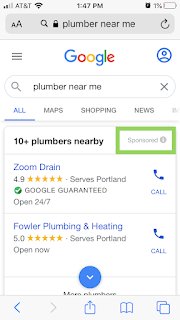

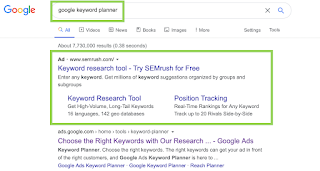

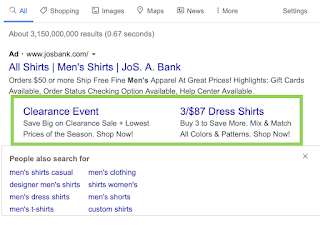
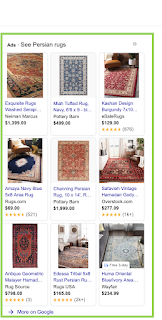
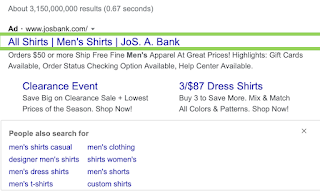

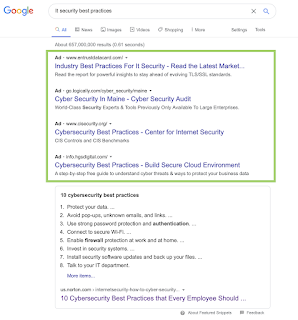


No comments:
Post a Comment